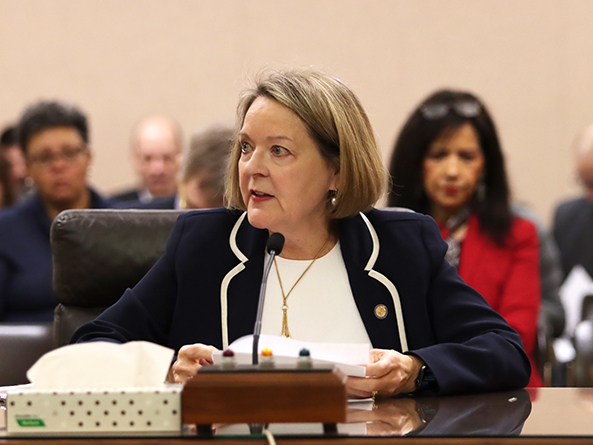Bill would create Indigenous peoples’ liaison office
The Judiciary Committee heard testimony Feb. 8 on a bill that would create an office to help coordinate efforts to investigate certain crimes against Indigenous people in Nebraska.

LB328, introduced by Lincoln Sen. Jane Raybould, would create the Office of Liaison for Missing and Murdered Indigenous Persons within the Nebraska Attorney General’s Office. The attorney general and the Commission on Indian Affairs would partner in selecting a full-time specialist to staff the office, giving preference to applicants of Indigenous descent.
The specialist’s duties would include identifying, collecting and directing resources and information to aid in combating the prevalence of missing and murdered Indigenous people in Nebraska. This would include synthesizing information from state, local, tribal and federal law enforcement entities involved in those cases and reporting information to tribes, communities, media and the public as appropriate.
The bill state’s legislative intent to provide state general funds to cover the office’s costs, but LB328 also would require the attorney general to pursue any available funding and provide legal guidance and coordination.
Raybould said research shows that Native Americans experience higher rates of crime and victimization than non-Native people, and violence against Native women and children is of particular concern. Native American women are murdered at an extraordinarily high rate, she said, nearly 10 times the national average on some reservations.
A lack of data standardization contributes to a lack of reporting on missing and murdered Native people, Raybould said. Jurisdictional issues, the dynamic nature of missing persons cases and questions over who should investigate — whether a tribal or non-tribal organization — also contribute to the problem, she said.
“The Nebraska State Patrol and tribal and non-tribal law enforcement cooperation needs to be increased,” Raybould said. “We need to enhance the awareness of reporting options and mechanisms to the Native American communities and we need to be aware of the potential interrelatedness of missing persons to human trafficking and other social challenges.”
Cheyenne Robinson, testifying on behalf of the Omaha Tribe of Nebraska, spoke in support of the bill. It’s important for tribes and Indigenous organizations to have the right point of contact with state officials, she said, but it’s even more important for public safety organizations to be culturally aware of how tribes and Indigenous organizations operate.
“Generally, there’s a lot of animosity between tribal citizens and law enforcement, but having [an] office that can understand and address time-sensitive cases could quickly bring together tribal, county and state officials to work as one,” Robinson said.
Rose Godinez, speaking on behalf of the ACLU of Nebraska, also testified in favor of the bill. Recent data shows that Omaha ranks 8th among cities for the highest number of missing and murdered Indigenous women, she said, and Nebraska ranked 7th among states.
“In this instance, historical issues regarding jurisdiction, the misunderstanding of race, ethnicity and political affiliation and the inconsistencies in databases on gender have led to a persistent and widespread lack of appropriate responses,” Godinez said. “A liaison between all key stakeholders, as set out in LB328, is an important step to address this ongoing crisis.”
Judi gaiashkibos, executive director of the Nebraska Commission on Indian Affairs, spoke in support of the proposal. She said it would be important for the liaison specialist to be Native American or someone who has worked with the Native American community to ensure the individual is culturally sensitive to the issues that Native Americans face.
Glen Parks, assistant attorney general and coordinator for the Nebraska Human Trafficking Task Force, spoke in a neutral capacity on LB328.
The attorney general’s office supports the bill’s objective, Parks said, but he noted several logistical concerns. For example, he said, the attorney general’s office generally does not seek federal funding for tasks and would like that provision removed.
Parks also asked for clarification regarding the proposed specialist’s required qualifications, the attorney general’s role in providing legal counsel and the possibility of achieving the bill’s purpose without creating a separate office.
No one testified in opposition to LB328 and the committee took no immediate action on it.


